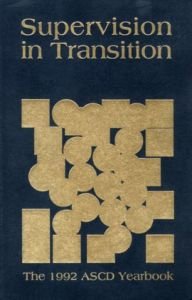In Supervision and Transition, editor Carl Glickman presents a series of essays that address shifting views on the nature of supervision in the '80s and '90s. As Glickman points out in his introduction, educational philosophy is currently dominated by a postmodernist acceptance of transitional theoretical perspectives. Viewpoints regarding supervision, in particular, have changed drastically in recent years, blurring the line between supervisors and instructors as the focus of supervision has shifted from pedagogy to subject knowledge and instruction. The book is divided into sections on the context, practice, preparation, and reflection of supervision, and the essays cover a wide range of issues, including teacher empowerment, case studies of large and small districts, and the role of moral authority in schools. The authors of the essays are as varied as the viewpoints they espouse: high school teachers, professors of education, district superintendents, and staff development consultants all pitch in to provide a well-rounded overview of supervision at the end of the 20th century.
In Collection
#51
Read It:
Yes
#51
Read It:
Yes
|
|
||||||||||||||
